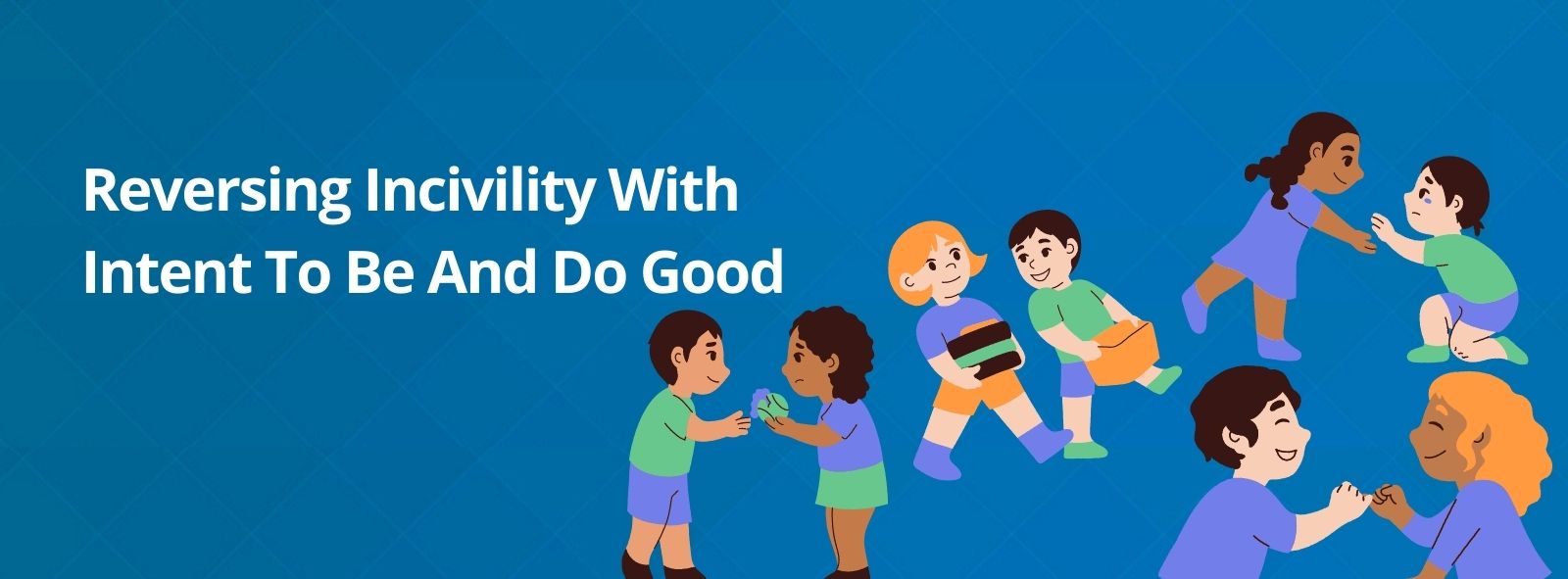Do a search on incivility and rudeness in the workplace and you will come up with hundred shifts of posts. It’s a hot topic for a reason…
As you’re looking for answers on how to improve your workplace climate, you’ll find a ton of great courses, resources and tips. There are tools to teach people how to speak in ways that are not inflammatory, that address the problem not the person, step-by-step guides on de-escalation, and setting expectations to create an environment where people speak and act with civility towards each other.
People spend a lot of time and money trying to develop leadership skills, build credibility and become better at expressing their ideas to others in an ongoing attempt to advance their careers. These are all great things to do, but what is missing from the lists, techniques and goals is a foundation based on personal motivation.
To establish a healthy, successful workplace climate there needs to be inner motivational intent to do good and to be good. Energy follows intent. Without real intent, strategies become empty shells. Share on X
So, unless we tap into the meaning of and repercussions to showing courtesy, respect and thoughtfulness to others, all the training in the world won’t make things better.
That intent to do and be good, brings out the best in us because it is rooted in our spiritual nature. It is like an inner aquifer from which we draw sustenance and develop virtues, in contrast to self-interest which brings out the worst in us, our vices. Virtues are closely related to spiritual principle. When we have looked within to clarity and anchor our intent in a spiritual principle, we are much more likely to treat others in ways that they will feel valued and appreciated. We will be civil because we want to bring joy to others’ lives. Civility is the outer expression of respect.
Children as young as 18 months show both altruism and selfishness. Whatever the parents pay attention to is what grows. It is the same with the workplace. Pay attention to practicing virtue and it will grow, not only in you, but in others because the aquifer that feeds your sense of good is the same that feeds the sense of good in others.

The intent to do and be good
When we actively and consciously strive to practice doing and being good at home and work, a foundation for satisfying human relationships is laid. One way to get started is to learn the language of virtue. Most of use don’t have a very big virtues vocabulary and being able to name the qualities we see and experience in others can be the first step in tapping into the virtues we and others already have.
Now let’s get into the operations part…
Learning to see virtue in others
The easiest way to start using the language of virtue is to first practice seeing it in others. Looking for qualities instead of faults can become an excellent counterbalance to criticism.
For example:
“Thank you for being helpful, it seems to come so naturally to you!”
“You said that so clearly.”
“Your thoughtfulness is really contagious.”
When you start focusing on finding the hidden gems of virtue in people, they will rise to the occasion to prove you right and do even more. Share on X
It is the same idea as focusing on the one good trait rather than the 10 bad ones. What you focus on grows.
You can also practice seeing virtue in yourself to cure the diseases of perfectionism and negative self-talk:
“I showed a lot of diligence in getting this done.”
“I’m proud of myself that I showed self-control when I didn’t lose my temper with my co-worker.”
“I can totally be assertive! Didn’t I just prove that to myself?”
Looking for confirmations of “good” throughout the day helps develop new neural pathways that stimulate joy in the brain rather than reinforcing negative thought loops that constrict and limit joy.
When you or others fall short, instead of jumping immediately to a negative judgment, consider acknowledging that you feel judgemental, then resetting your mind and heart to look for good. That might sound like:
“I know we can do this. What could help? Perseverance? ”
“I missed that opportunity, but I will catch the next one. I can be patient with myself.”
Imagine how much critical self-talk could be eliminated when it becomes more natural to see life and other people in this light! Imagine how the ripple effect from this practice can put others into a frame of mind to see opportunities and possibilities instead of limitations! Just one important caveat: the practice of looking for the good is not a denial of problems or feelings. It recognizes that there is a difficulty, stops to acknowledge the feelings that creates and then intentionally seeks what could be good. This has the effect of expanding possibilities rather than constricting them.
One way to “get good” at doing this is with a one-two minute daily practice.
Priming, continuing and ending the day with being and doing good
During my morning routine I randomly choose a “virtues card” from the package I ordered from The Virtues Shop (you can also have this on your phone with the Virtues Cards app, but I like to have the physical cards too). It is kind of uncanny how whatever I pick always speaks to me directly about something I need to practice that day. Doing a “virtues pick” in the morning is a great way to develop the habit of using virtues in your language and throughout your day. If you do this regularly it will become more and more automatic and can be a great anchoring tool when faced with an issue or challenge that feels emotionally triggering.
Just yesterday I was feeling overwhelmed with all my responsibilities. I picked the card “peacefulness,” read the definition and immediately decided to take a deep breath and think of the words ‘be peaceful’ when I was feeling overwhelmed. I used the word “peaceful” three times in workplace conversations, and noticed how others responded by being calmer and more focused.
In conclusion, we can certainly spend time focusing on incivility and learning about how and when it happens, which will help workplaces understand the context more clearly. But if we want to change it, that will take a decisive step for individuals to intentionally be and do good, to bring good. Certainly, this orientation takes some practice and the ability to suspend judgement of ourselves and others. But doesn’t everything that matters require those same abilities?
We are capable of choosing a plan of action and then following it until we gain mastery, it is one of our inner powers, we just need to focus on it so that it grows.
About the Author
Dr. Marie Gervais is the author of “The Spirit of Work: Timeless Wisdom, Current Realities”. She holds a PhD in Culture and Learning in the Workplace. Through her work in leadership training, she has coached more than 500 supervisors, managers and business owners for career and business success. She hosts the Culture and Leadership Connections podcast, which features interviews with diverse leaders in a variety of professions. Her publications span industry and academic journals on topics including the future of work, workplace communication, productivity and psychological safety in the workplace. Her online courses and products are used by managers and career developers around the world.
To learn more about the book, check out this link: https://shiftworkplace.com/the-spirit-of-work/










